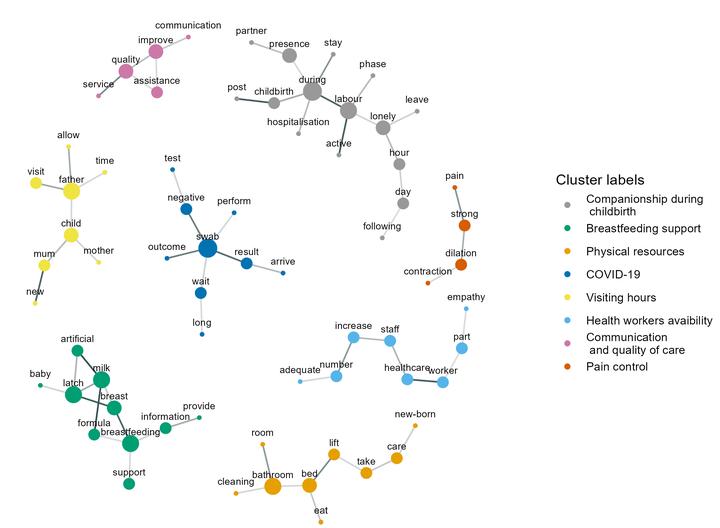Women’s suggestions on how to improve the quality of maternal and newborn care during the COVID-19 pandemic in Italy: A co-occurrence network analysis
 Women’s suggestions on how to improve the quality of maternal and newborn care: major themes in the co-occurrence network.
Women’s suggestions on how to improve the quality of maternal and newborn care: major themes in the co-occurrence network.Abstract
Background: Recent evidence revealed significant gaps in the quality of maternal and newborn care in the World Health Organization (WHO) European Region (EUR) countries. Collecting and analyzing women’s views on their needs and priorities is crucial for developing actions to improve the quality of maternal and newborn care. With this study from the IMAgiNE EURO Project, we aimed to add to previous quantitative studies by analysing emerging themes from women’s suggestions on how to improve the quality of maternal and newborn care during facility-based birth in Italy during the COVID-19 pandemic.
Methods: We collected data from mothers giving birth during the coronavirus 2019 (COVID-19) pandemic using a validated online anonymous WHO standard-based questionnaire consisting of open-ended questions. Using a word co-occurrence network (WCON), we analysed responses in Italian from women who gave birth between March 2020 and March 2022. This approach entails a graphical representation of word pairings that frequently co-occur across sentences and compose clusters.
Results: The texts, produced by 2010 women participating in the study, consisted of 79204 words and 3833 sentences. Eight clusters emerged with WCON, the three largest of which were related to companionship during childbirth, breastfeeding support, and physical resources. The term “swab”, associated with other terms in the COVID-19 domain, had the highest degree of centrality, thus representing a core topic.
Conclusions: The key emerging themes from women’s suggestions can be used to shape policies to improve the quality of care for mothers and newborns. Our WCON analysis offers a valid approach to quickly screen large textual data on quality of care, providing a first set of major themes identified by clusters. As such, it could be used to improve documentation of service users’ suggestions promoting the engagement of both researchers and policymakers.